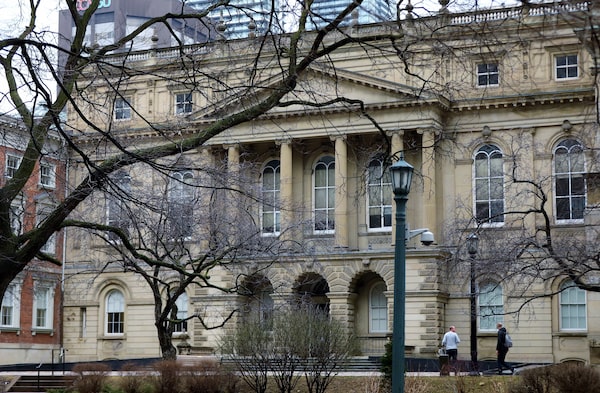
The Ontario Court of Appeal decided a child-abduction case that had run for 2.5 years.Colin Perkel/The Canadian Press
All international child abduction cases in Ontario are to go before a judge for an initial meeting within seven days of an application for the child’s return, under new family law rules that took effect this month.
Even as families in other kinds of cases face staggering waits – Toronto judges are booking now for June, in disputes that need more than an hour to be heard – the province’s new rules stress the priority for international abductions by a parent, alongside domestic child-protection cases and other urgent matters.
The seven-day rule reflects the urgency of achieving quick resolutions to abduction cases that involve member countries of the Hague Convention on the Civil Aspects of Child Abduction, an international agreement that includes Canada.
All provinces have absorbed the Hague Convention into their laws, including a six-week time limit for deciding cases that involve abduction. The Ontario government’s new rules spell out the six-week limit for Hague cases, and say non-Hague cases should be resolved “promptly.”
The emphasis on prompt hearings and a fast return to country of origin can be at odds with the reality of international cases.
This past summer, the Ontario Court of Appeal decided a child-abduction case that had run for 2½ years. The court found that a mother from Peru had wrongly removed her child to Canada and that the Ontario judge who heard the case had wrongly allowed the process to go on and on. But the boy, now nine years old, was so established here he could not be sent back.
“It has been more than two-and-a-half years since the abduction, and it is simply too late to return the child, who is now estranged from the father,” Justice Mary Lou Benotto wrote in a 3-0 ruling in August. (The appeal process took nine months, of which roughly two months were to schedule a hearing and decide the case.)
Russell Alexander, a lawyer who publishes a family-law newsletter, said in an interview the case “seemed to have fallen through the cracks, and represented a failure of the justice system.”
The ruling sends the wrong message to child abductors, said Rollie Thompson, a professor emeritus at Dalhousie’s Schulich School of Law in Halifax.
“This kind of case encourages other abducting parents to come to Ontario, to gain the custodial advantage of delay.”
Peru is a member of the Hague Convention; the pact’s purpose is to ensure the prompt return of wrongly removed children. Countries that sign on accept that other members’ legal systems make rulings in the best interests of children.
But that is not what happened when the boy’s mother, Monica Izquiero Rubio, brought him to London, Ont., in 2019, saying she was fleeing her ex-husband’s violence and threats. Martin Berendson, the boy’s father, denies the allegations. He followed and applied to the province’s legal system for his son’s return.
Ms. Rubio argued in court that her son would be at risk of intolerable physical or psychological harm if returned to Peru. Under the Hague Convention, intolerable harm creates an exception to the principle of a prompt return.
Ontario Superior Court Justice Denise Korpan held 33 days of hearings over six months. In the end – after another four months to write an 85-page decision – she ruled that the boy would be at grave risk if sent back. Critically, she also found that the Peruvian court system would not be able to protect him.
The Ontario Court of Appeal said Justice Korpan went wrong in several ways.
It said the exception for intolerable harm is not to be used to rehear cases tried in another Hague country. Peruvian courts, Justice Benotto wrote, had found violence on both sides and the mother’s allegations to be unsubstantiated; they confirmed the importance of the boy’s relationship with his father, and ordered joint custody.
The Ontario appeal court said Justice Korpan had not explained why she concluded Peru’s courts were not capable of determining child-related issues. The appeal court also said Justice Korpan had recited the mother’s evidence as fact. It said the judge did not meet her obligation for a prompt resolution.
“The delay itself amounts to a manifest or clear error,” Justice Benotto wrote.
Frances Wood, editor of the Ontario Family Law Reporter, said the appeal court tried to send a message that the province’s courts will live up to their obligations under the Hague convention. Still, “if someone raises a real concern, then the courts are always going to have to be open to hearing the relevant evidence.”
Mr. Berendson said the appeal court was wrong to conclude the child was too established here to go back. He gave the example of military families that take their children abroad and then return home.
He said he fears he will be kicked out of Canada, as his legal status is that of a tourist. “My child has been kidnapped in Canada. And now Canada says they are keeping my child. So what do I do? I am not leaving behind my son.” Ms. Rubio and the boy have applied for refugee status. Her lawyer in Family Court, Debora Brubacher, declined a request for comment.
The ex-spouses are now in court proceedings to work out a parenting plan. Mr. Berendson is subject to a restraining order that prevents him from seeing the boy and his mother, based on Justice Korpan’s findings he poses a risk. The appeal court urged the Family Court to take a “fresh approach to the evidence,” and recommended the father, who was unrepresented on appeal, seek legal advice.
Mr. Berendson says he will represent himself. Justice Korpan ordered him to pay Ms. Rubio $50,000 in legal costs, and he says he is broke and cannot afford a lawyer.
 Sean Fine
Sean Fine